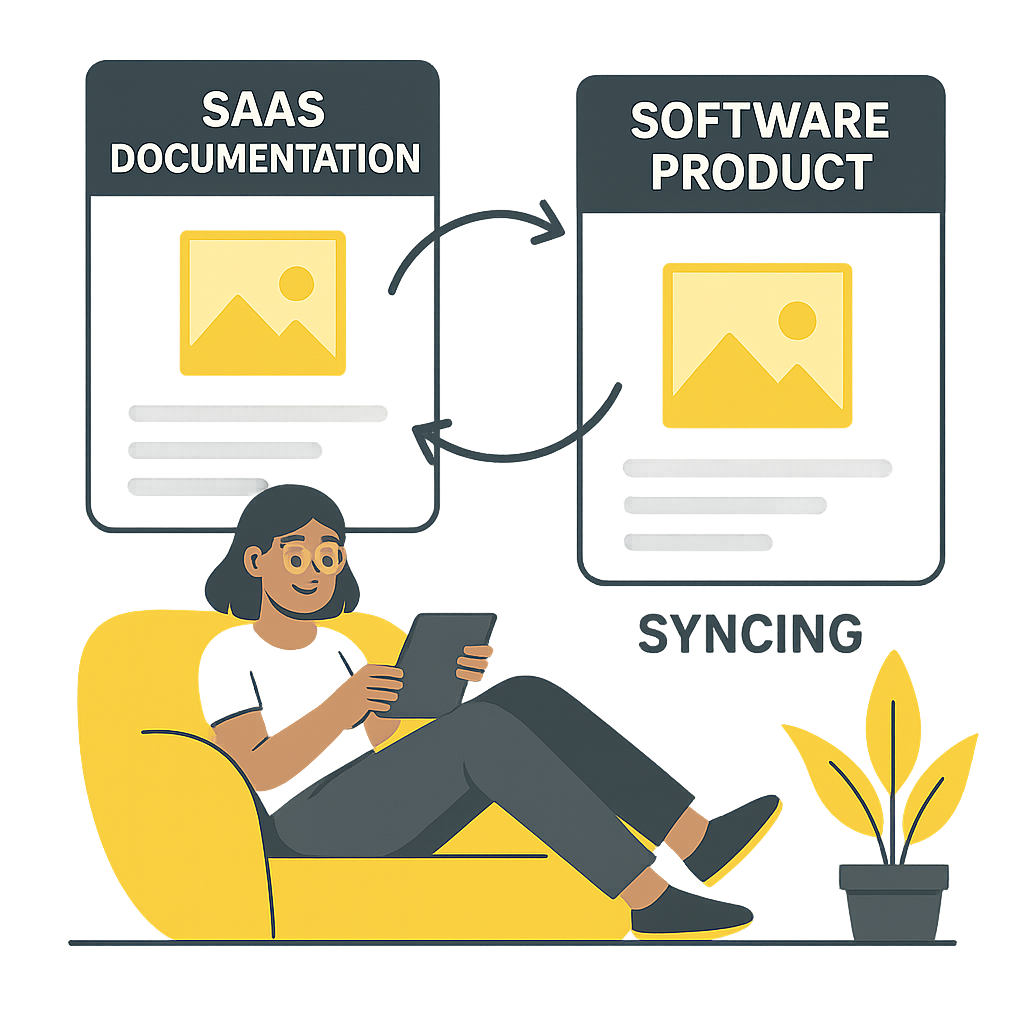Docusaurus Screenshot Automation: Keep Your Developer Docs Current with FreshShots

Docusaurus creates beautiful developer documentation, but keeping screenshots current is a constant struggle. APIs evolve, UIs change, and code examples update frequently. FreshShots automates Docusaurus screenshot management, ensuring your developer docs stay accurate without manual maintenance.
Why Developer Documentation Screenshot Management is Hard
Developer docs have unique challenges:
- Rapid iteration: Features change daily in modern development
- Multiple environments: Local, staging, production, and demo environments
- API versioning: Different versions need different screenshots
- Code examples: Screenshots must match current code samples
- Open source coordination: Multiple contributors, inconsistent screenshot quality
- Technical accuracy: Outdated screenshots confuse developers and slow adoption
How FreshShots Transforms Docusaurus Documentation
FreshShots provides developer-focused automation:
- Environment-specific screenshots: Capture from dev, staging, or production
- API documentation visuals: Automatically screenshot API responses
- Code example synchronization: Screenshots that match current code
- Consistent developer experience: Same quality across all documentation
- Version control integration: Screenshots update with code deployments
Complete Docusaurus + FreshShots Setup
Step 1: Prepare Your Application for Screenshots
Tag your application’s key interfaces:
<!-- API Dashboard -->
<div data-freshshots-id="api-dashboard" class="dashboard-container">
<!-- API key management, usage stats -->
</div>
<!-- Code example output -->
<div data-freshshots-id="api-response-example" class="response-container">
<!-- Live API response -->
</div>
<!-- Developer console -->
<section data-freshshots-id="dev-console" class="console-interface">
<!-- Interactive API console -->
</section>
<!-- Authentication flow -->
<form data-freshshots-id="auth-flow" class="auth-container">
<!-- OAuth or API key authentication -->
</form>
Step 2: Create Developer-Focused Workflows
API Documentation Workflow:
[
{
"action": "visit_page",
"url": "https://api-demo.yourapp.com/dashboard"
},
{
"action": "take_screenshot",
"selector": "api-dashboard",
"save_screenshot_to": "api-dashboard-overview.png",
"viewport_size": { "width": 1200, "height": 800 }
},
{
"action": "visit_page",
"url": "https://api-demo.yourapp.com/console"
},
{
"action": "type_input",
"selector": "api-endpoint-input",
"input_value": "/api/v1/users"
},
{
"action": "click_element",
"selector": "execute-button"
},
{
"action": "take_screenshot",
"selector": "api-response-example",
"save_screenshot_to": "api-response-users.png"
}
]
Authentication Documentation Workflow:
[
{
"action": "visit_page",
"url": "https://yourapp.com/developer/auth"
},
{
"action": "take_screenshot",
"selector": "auth-flow",
"save_screenshot_to": "oauth-setup.png"
},
{
"action": "click_element",
"selector": "generate-key-button"
},
{
"action": "take_screenshot",
"selector": "api-key-display",
"save_screenshot_to": "api-key-generated.png"
}
]
SDK Example Workflow:
[
{
"action": "visit_page",
"url": "https://sdk-demo.yourapp.com/example"
},
{
"action": "take_screenshot",
"selector": "code-editor",
"save_screenshot_to": "sdk-code-example.png"
},
{
"action": "click_element",
"selector": "run-example-button"
},
{
"action": "take_screenshot",
"selector": "output-console",
"save_screenshot_to": "sdk-output-result.png"
}
]
Step 3: Integrate with Docusaurus
Method 1: Direct Markdown Integration
In your Docusaurus markdown files:
---
id: api-overview
title: API Overview
---
# Getting Started with Our API
## Dashboard Overview

The API dashboard provides an overview of your usage, API keys, and quick access to documentation.
## Making Your First Request

Here's what a successful response looks like when calling the `/api/v1/users` endpoint.
Method 2: Custom Docusaurus Components
Create reusable screenshot components:
// src/components/FreshShot.jsx
import React from 'react';
export default function FreshShot({
src,
alt,
width = '100%',
caption
}) {
const cdnUrl = `https://cdn.freshshots.io/1/${src}`;
return (
<figure style={{ margin: '2rem 0' }}>
<img
src={cdnUrl}
alt={alt}
style={{
width,
borderRadius: '8px',
border: '1px solid var(--ifm-color-emphasis-200)'
}}
/>
{caption && (
<figcaption style={{
textAlign: 'center',
fontStyle: 'italic',
marginTop: '0.5rem'
}}>
{caption}
</figcaption>
)}
</figure>
);
}
Usage in MDX:
import FreshShot from '@site/src/components/FreshShot';
# API Authentication
## Setting Up OAuth
<FreshShot
src="oauth-setup.png"
alt="OAuth configuration interface"
caption="Configure OAuth settings in the developer dashboard"
/>
## Generating API Keys
<FreshShot
src="api-key-generated.png"
alt="Generated API key display"
width="600px"
caption="Your new API key will be displayed once"
/>
Step 4: Advanced Docusaurus Patterns
API Reference with Live Examples:
---
id: users-api
title: Users API
---
# Users API Reference
## GET /api/v1/users
Retrieve a list of users from your account.
### Example Request
```bash
curl -X GET "https://api.yourapp.com/v1/users" \
-H "Authorization: Bearer YOUR_API_KEY"
Example Response
Authentication Required
**SDK Documentation with Screenshots:**
```mdx
# JavaScript SDK Quick Start
## Installation
```bash
npm install @yourapp/sdk
Basic Usage
import { YourAppSDK } from '@yourapp/sdk';
const client = new YourAppSDK({
apiKey: 'your-api-key'
});
const users = await client.users.list();
console.log(users);
SDK Console Output
## Advanced Developer Documentation Patterns
### Multi-Environment Documentation
Document different environments:
```json
{
"action": "visit_page",
"url": "https://staging-api.yourapp.com/dashboard"
}
Create environment-specific screenshots:
api-dashboard-staging.pngapi-dashboard-production.pngapi-dashboard-sandbox.png
Error State Documentation
Capture and document error states:
[
{
"action": "visit_page",
"url": "https://api-demo.yourapp.com/console"
},
{
"action": "type_input",
"selector": "api-key-input",
"input_value": "invalid-key"
},
{
"action": "click_element",
"selector": "test-button"
},
{
"action": "take_screenshot",
"selector": "error-response",
"save_screenshot_to": "api-auth-error.png"
}
]
Version-Specific Documentation
Create workflows for different API versions:
[
{
"action": "visit_page",
"url": "https://api-demo.yourapp.com/v2/console"
},
{
"action": "take_screenshot",
"selector": "v2-interface",
"save_screenshot_to": "api-v2-interface.png"
}
]
Docusaurus Build Integration
Automated Screenshot Updates
GitHub Actions Workflow:
name: Update Documentation Screenshots
on:
push:
branches: [main]
workflow_dispatch:
jobs:
update-docs:
runs-on: ubuntu-latest
steps:
- name: Checkout code
uses: actions/checkout@v3
- name: Wait for deployment
run: sleep 120
- name: Trigger FreshShots workflows
run: |
# API documentation screenshots
curl -X POST https://api.freshshots.io/v1/run/201 \
-H "x-api-key: ${{ secrets.FRESHSHOTS_API_KEY }}"
# SDK examples screenshots
curl -X POST https://api.freshshots.io/v1/run/202 \
-H "x-api-key: ${{ secrets.FRESHSHOTS_API_KEY }}"
# Authentication flow screenshots
curl -X POST https://api.freshshots.io/v1/run/203 \
-H "x-api-key: ${{ secrets.FRESHSHOTS_API_KEY }}"
- name: Wait for screenshots
run: sleep 180
- name: Build Docusaurus
run: |
npm install
npm run build
- name: Deploy to GitHub Pages
uses: peaceiris/actions-gh-pages@v3
with:
github_token: ${{ secrets.GITHUB_TOKEN }}
publish_dir: ./build
Pre-build Screenshot Validation
// scripts/validate-screenshots.js
const axios = require('axios');
const fs = require('fs').promises;
async function validateScreenshots() {
const screenshotUrls = [
'https://cdn.freshshots.io/1/api-dashboard-overview.png',
'https://cdn.freshshots.io/1/api-response-users.png',
'https://cdn.freshshots.io/1/oauth-setup.png'
];
for (const url of screenshotUrls) {
try {
const response = await axios.head(url);
if (response.status !== 200) {
throw new Error(`Screenshot not available: ${url}`);
}
console.log(`✅ ${url}`);
} catch (error) {
console.error(`❌ ${url}: ${error.message}`);
process.exit(1);
}
}
console.log('All screenshots validated successfully!');
}
validateScreenshots();
Add to package.json:
{
"scripts": {
"validate-screenshots": "node scripts/validate-screenshots.js",
"build": "npm run validate-screenshots && docusaurus build"
}
}
Developer Experience Optimization
Screenshot Loading Performance
Optimize screenshot loading in Docusaurus:
// src/components/OptimizedFreshShot.jsx
import React, { useState } from 'react';
export default function OptimizedFreshShot({ src, alt, ...props }) {
const [loaded, setLoaded] = useState(false);
const cdnUrl = `https://cdn.freshshots.io/1/${src}`;
return (
<div style={{ position: 'relative' }}>
{!loaded && (
<div style={{
backgroundColor: '#f0f0f0',
height: '200px',
display: 'flex',
alignItems: 'center',
justifyContent: 'center'
}}>
Loading screenshot...
</div>
)}
<img
src={cdnUrl}
alt={alt}
onLoad={() => setLoaded(true)}
style={{
display: loaded ? 'block' : 'none',
...props.style
}}
{...props}
/>
</div>
);
}
Dark Mode Support
Ensure screenshots work with Docusaurus dark mode:
import { useColorMode } from '@docusaurus/theme-common';
export default function ThemeAwareFreshShot({ src, darkSrc, alt }) {
const { colorMode } = useColorMode();
const imageSrc = colorMode === 'dark' && darkSrc ? darkSrc : src;
const cdnUrl = `https://cdn.freshshots.io/1/${imageSrc}`;
return (
<img
src={cdnUrl}
alt={alt}
style={{
border: colorMode === 'dark'
? '1px solid #444'
: '1px solid #ddd'
}}
/>
);
}
Open Source Documentation Best Practices
Contributor Guidelines
Create guidelines for screenshot management:
# Contributing to Documentation
## Screenshot Guidelines
1. **Use FreshShots URLs**: Always use CDN URLs for consistency
2. **Follow naming conventions**: `feature-component-state.png`
3. **Test in staging**: Capture from staging environment first
4. **Update workflows**: Modify FreshShots workflows, don't upload manual screenshots
## Adding New Screenshots
1. Tag UI elements with `data-freshshots-id`
2. Update FreshShots workflow in our account
3. Use CDN URL in documentation
4. Test the documentation build
Community Screenshot Management
For open source projects:
# .github/workflows/community-screenshots.yml
name: Community Screenshot Updates
on:
pull_request:
paths: ['docs/**']
jobs:
check-screenshots:
runs-on: ubuntu-latest
steps:
- name: Check for manual screenshots
run: |
if git diff --name-only origin/main...HEAD | grep -E '\.(png|jpg|jpeg|gif)$'; then
echo "❌ Manual screenshot files detected"
echo "Please use FreshShots CDN URLs instead"
exit 1
fi
echo "✅ No manual screenshot files found"
Measuring Developer Documentation Success
Analytics Integration
Track screenshot performance:
// src/theme/DocItem/index.js
import React, { useEffect } from 'react';
import OriginalDocItem from '@theme-original/DocItem';
export default function DocItem(props) {
useEffect(() => {
// Track screenshot visibility
const screenshots = document.querySelectorAll('img[src*="freshshots.io"]');
const observer = new IntersectionObserver((entries) => {
entries.forEach((entry) => {
if (entry.isIntersecting) {
// Track screenshot view
analytics.track('Screenshot Viewed', {
url: entry.target.src,
page: window.location.pathname
});
}
});
});
screenshots.forEach((img) => observer.observe(img));
return () => observer.disconnect();
}, []);
return <OriginalDocItem {...props} />;
}
Documentation Quality Metrics
| Metric | Before FreshShots | After FreshShots |
|---|---|---|
| Screenshot accuracy | 45% current | 100% current |
| Developer onboarding time | 4.2 days average | 2.1 days average |
| API adoption rate | 23% try after reading docs | 67% try after reading docs |
| Support tickets | 150/month (confusion) | 45/month |
| Documentation maintenance | 25 hrs/month | 3 hrs/month |
Troubleshooting Common Issues
Build failures due to missing screenshots:
- Implement screenshot validation in CI
- Use fallback images for development
- Set up monitoring for CDN availability
Screenshots don’t match current code:
- Align FreshShots workflows with deployment pipeline
- Use staging environment for testing
- Implement webhook notifications for completion
Performance issues with many screenshots:
- Implement lazy loading
- Use appropriate image sizes
- Consider WebP format for better compression
Ready to transform your Docusaurus documentation? Start your free FreshShots account and eliminate manual screenshot management forever.
Building developer tools or API documentation? Contact our team for personalized guidance on documentation automation.

